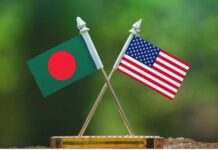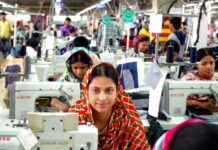ADB country chief pledges continued support as the development partner marks its 40th year in Bangladesh tomorrow
Bangladesh needs to grow rapidly through massive investment in infrastructure, skills development and trade logistics to become a middle income nation by 2021, the Asian Development Bank’s country head said.
“Bangladesh needs to accelerate investment in diversifying the sources of growth and realising its economic growth aspiration,” M Teresa Kho, country director of the Manila-based lender, told The Daily Star in Dhaka on Wednesday.
Her comments came as the bank celebrates its 40th year in Bangladesh tomorrow, basking in the glory of some of its stellar achievements, also being mindful of the challenges the country faces.
“In the past four decades, ADB has become a long-standing development partner of Bangladesh,” said Kho.
“ADB has always stood by the country and its people — whether during natural disasters as seen in 1991 and 1998 or global food price shock of 2008 or in the height of the recent global economic crisis.”
ADB has always structured its activities in line with the needs of the country.
In the 1970s, the bank was involved in rehabilitation and infrastructure, following devastation of the Liberation War. Programmes in agriculture and rural investment dominated its activities in the following decade.
In the 1990s, the bank ventured into power and transport, along with industrial development and the financial sector. In 2000, the bank entered primary education and health and undertook investment in rural infrastructure.
By the mid-2000s, the bank made a foray into the financial and capital market reform process.
From June 1973 till the end of 2012, ADB provided 234 loans worth $14.1 billion and 389 technical assistance projects to support project design and capacity enhancement worth $221.7 million.
The bank’s latest successes include implementation of the most successful solar home system in Bangladesh.
With an initial target of 50,000 solar home systems, IDCOL’s (Infrastructure Development Company Ltd) programme installed more than two million by the end of March 2013.
ADB provided $78 million to the programme, which financed the installation of 330,000 systems.
In another major development, an ADB-supported project helped bring electricity from India — the first-ever power trade in South Asia.
The bank lent $100 million on concessional terms to finance the transmission lines and high-voltage direct current substation components under the project worth $158.6 million.
Since Bangladesh joined ADB in 1973, the power sector has received 32 public sector loans and one private sector investment, totalling about $2.9 billion, to improve the capacity and quality of power supply.
Although ADB could not get involved in the construction of the Padma Bridge project after the government pulled out of talks following much drama over a corruption allegation, the bank helped set up the existing largest bridge project in Bangladesh nearly two decades ago.
ADB’s funding accounting for 22 percent of the cost of $962 million for the Bangabandhu Multipurpose Bridge has lifted a million of people out of poverty and improved road and railway links connecting the impoverished northern part with the capital, according to an impact study.
The bank’s assistance to education accounts for 9.32 percent of ADB’s total assistance to Bangladesh from 1973 to 2012, amounting to $1.28 billion.
An MBA from Stanford University, Kho said the country’s achievement in the last four decades has been encouraging after starting as an independent nation in 1971 with an extraordinarily bleak prognosis.
“The country successfully coped with these challenges and as a result, growth rates steadily moved upward. Economic growth has also been largely inclusive and broad based, with notable progress in poverty reduction.”
“Food production kept pace with the population growth. Population control progra-mmes helped in slowing down population growth, income per capita rose significantly in real terms, and poverty fell sharply coupled with improved life expectancy, higher literacy, and lower mortality.”
The ADB country chief, who has been with the bank since 1997, is also impressed by Bangladesh’s achievement in most of the millennium development goals.
“Bangladesh’s achievement in the economic and social indicators has been quite remarkable.”
“More importantly, the proportion of population living below the poverty line has gone down below 31.5 percent.”
ADB has finalised its priorities for the country from 2014 to 2016, she said. In the three years, the bank would invest more in energy efficiency, railway connectivity, secondary education skills, and furthering capital market reforms.
Kho also talks about regional cooperation and integration, which can benefit countries in South Asia including Bangladesh.
“Increasing trade activity can facilitate jobs creation, economic activity and economic growth. Investment has to be moved to increase port efficiency, develop roads and transport connectivity, keeping an eye on future.”
“We will work on trade facilitation, cross-border energy trade and developing transport connectivity in the next three years.”
She said Bangladesh would have to enhance the business climate, improve trade logistics and infrastructure and address skills shortage in order to grow rapidly.
She says about two million people enter the country’s job market a year. “It is important that the country invests heavily in secondary education and skills development.”
She makes a list of challenges for the country.
“Climate change would pose a risk for the country. It will require more resources and capacity to address the climate change risks. The use of land and its planning have become very critical for the country because of a shortage of land, which is needed for industrial development.”
“Urban congestion is going to be a challenge for the country, as people seek better opportunities, they will move to urban areas and stretch the capacity of the cities to provide services for them.”
She however assured Bangladesh of continued support. “We will be your partner in helping you meet the challenges.”
She said Bangladesh would require heavy investment in order to solve some of its major challenges.
“The government can work with development partners, civil society organisations and private sector so both public and private resources can be brought together to address the challenges.”
Although she does not delve into the debate over the corruption issue of Padma Bridge, she said the bridge project remains one of the key investment projects in the country’s history, because it is supposed to connect the south-western part of the country with the northern part and the capital, and can benefit 20 million people with increased trade and jobs.
fazlur.rahman@thedailystar.net
Source: The Daily Star










